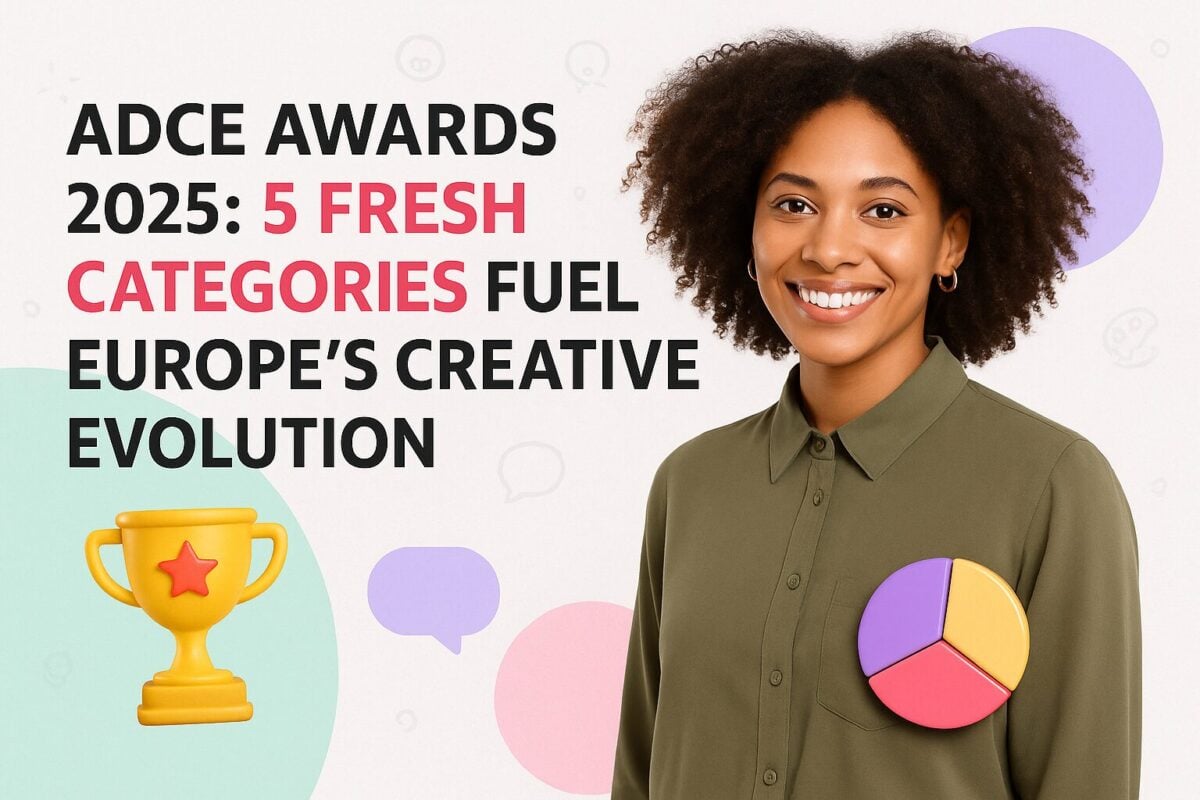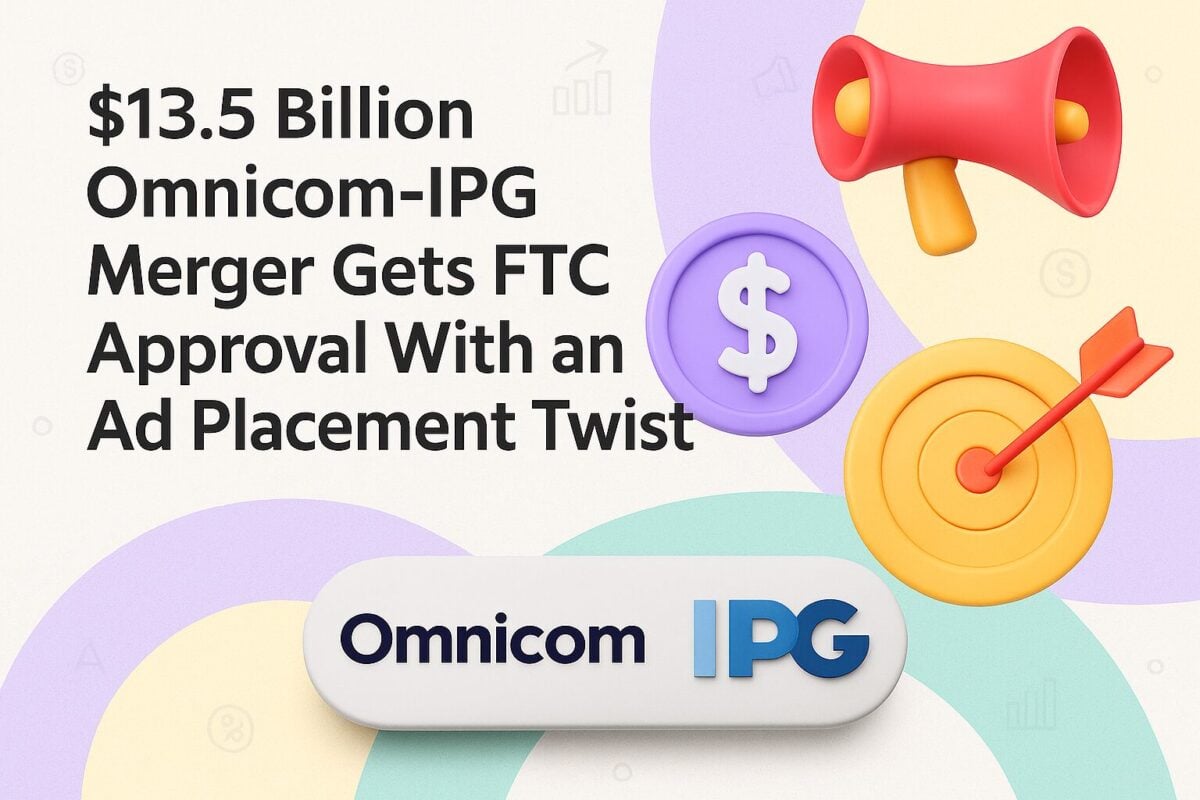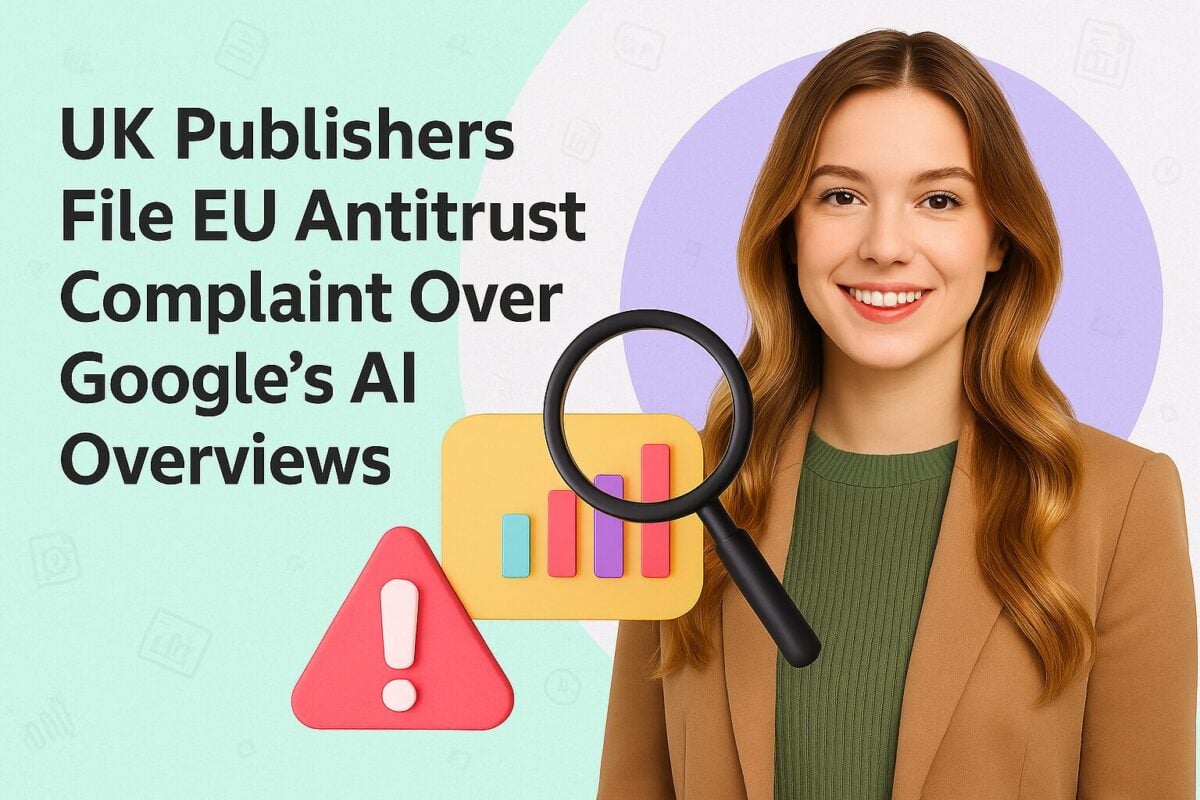Starting a digital marketing agency is merely the beginning. The next step is scaling it up to make a name for yourself in the industry.
But how exactly do you grow your digital marketing agency? Just how you help your clients grow.
As a business running in a digitally inclined world, most of your growth strategies will be associated with digital marketing. You'll also have to make some internal changes, such as upskilling and team expansion.
The guide below covers multiple tips to grow your digital marketing agency.
How To Grow a Digital Marketing Agency:
- 1. Set Yourself Up For Growth - Choose a Niche and Target Market
- 2. Create a Lead Magnet
- 3. Use Case Studies as Social Proof
- 4. Use Content Marketing to Establish Thought Leadership
- 5. Leverage Email Marketing to Convert Leads
- 6. Use Social Media to Your Advantage
- 7. Run Paid Ads
- 8. Monitor Your Performance Metrics
- 9. Upskill Your Team
- 10. Generate Recurring Revenues
- 11. Increase Your Service Offerings
- 12. Use Influencer Marketing to Get the Word Out
When Should You Start Growing Your Agency?
Some things you can start doing right off the bat. Your regular marketing campaigns are amongst those.
You can start strategizing and executing your own marketing plan right after you've opened your doors for business.
But when does the scaling process begin? Usually, it's when you see one of these signs:
- Consistent influx of new clients
- Overwhelming workload
- Sufficient financial resources for expansion
If you're getting enough work to keep all hands busy, it's time to think about expansion. You should also have sufficient financial resources to afford the growth.
Another prominent telltale sign is the need to turn down clients due to a lack of resources. If that has happened a few times, it's a clear sign that it's time to grow your agency.
How to Grow a Digital Marketing Agency: Essential Tips
The growth trajectory for every digital marketing agency will look different. For some, it's more of a steady climb, but for others, it can be exponential once they hit the right formula.
The following tips can help every digital marketing agency grow, regardless of their current stage.
1. Set Yourself Up For Growth - Choose a Niche and Target Market
Even before you start doing the actual work of growing your agency, you must set your business up for potential success.
For one, lower your competition by sticking to a niche or a few related services. Being the jack of all trades works for some, but as a beginner, it's better to stick with what you know best.
For example, Delmain only caters to dental practices. The agency offers dental marketing strategies, paid advertisements, and website design.
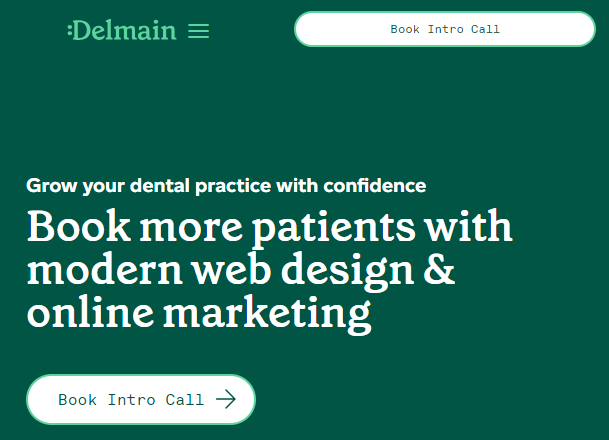
Similarly, LawRank helps lawyers and law firms with SEO and PPC.

In both cases, the agencies have focused on a specific niche. Being the go-to agency in your field helps attract and retain more clients. You're also not in competition with the big fish who already dominate the general digital marketing space.
Apart from niche selection, make sure you have an excellent team. You don't need to have an expert for every digital marketing facet. But the people you do have for the services you offer should be the best at what they do.
Also, your unique selling proposition (USP) should be enticing enough to warrant growth. What value do you offer that others don't?
Get these fundamentals right, and you'll have a solid foundation for your agency to grow.
2. Create a Lead Magnet
A lead magnet is a free resource that you offer your potential clients in exchange for their contact information.
It can be an e-book, a checklist, a guide, a free consultation, or anything else that your target audience would find valuable.
Most people who visit your marketing agency's website will not be ready to hire you immediately. There may be many reasons for this. They may not have the budget, may not trust you yet, or may simply not be ready to commit.
Either way, you don't want them to forget about you after they leave your website. Instead, you want to continue nurturing the relationship and eventually convert them into paying clients.
A lead magnet is a great way to do just that.
You offer them something valuable for free. They give you their contact information, such as email address. It's a win-win.
Delmain does this pretty well. The marketing agency provides a free resource to visitors about attracting more patients for their dental practices in exchange for their names and email addresses.

The agency then nurtures these visitors with email marketing.
When creating a lead magnet, keep two things in mind. First, it shouldn't be something generic that your target audience can easily find with a Google search.
For example, at Influencer Marketing Hub, we conduct extensive surveys on influencer marketing and curate reports that we share with our audience. It's something they cannot find elsewhere.
Second, your lead magnet should be related to your services and your target audience's industry. For example, if you serve healthcare professionals, a resource related to healthcare marketing is more relevant than one on general marketing tips.
Pro tip: If a visitor does end up calling your marketing agency or getting in touch through the contact form, don't leave them hanging. On average, businesses take 47 hours to respond to a lead, which isn't quick enough. If you respond within five minutes, you're 100 times more likely to connect with that lead than if you called them 30 minutes later. So, be super proactive in capitalizing on those leads.
Be Top Local explains this perfectly by saying,
When you're about to spend $8,500 in marketing dollars to make the phone ring, the last thing you want is to lose leads to a busy phone line.
3. Use Case Studies as Social Proof
It's one thing for you to say you'll take your client's business to great heights and boost their revenue, and it's another to show them you've done it for other clients.
Case studies provide social proof. In simple words, they show that you're not just all talk, but you have the results to back it up.
And social proof sells. According to BrightLocal's recent research, 36% of consumers read reviews for a business on at least two sites before choosing to purchase. 41% of consumers read reviews on over three websites.
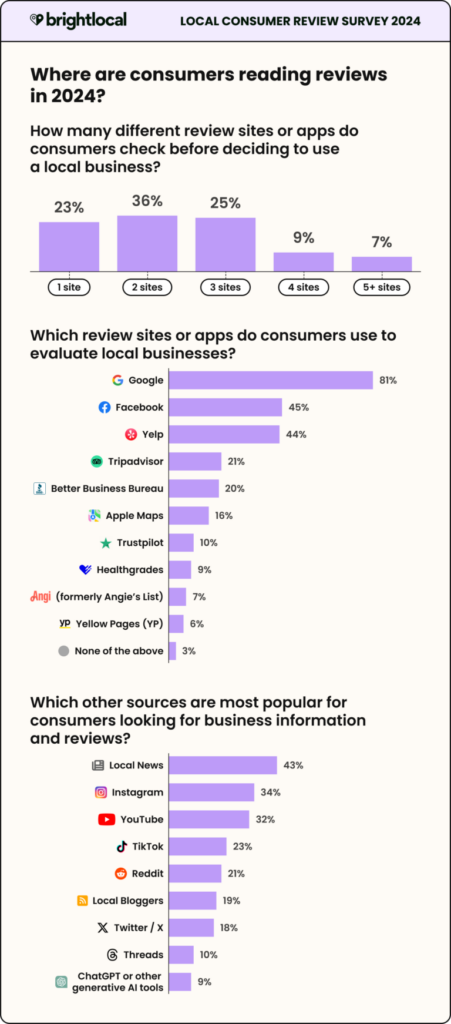
So, you want to have excellent third-party reviews and show case studies on your website.
The case studies you show should be recent and backed by data. Let's say you're a digital marketing agency with a clientele in the construction industry.
Your case studies should cover three main sections:
- Challenge: The challenge is the problem the client was facing before you stepped into the picture. In this scenario, it could be low website traffic or poor online visibility.
- Solution: Explain the strategy you implemented to tackle the problem. In our example, it could be optimizing their website and creating targeted campaigns for their services.
- Results: This is the part most people will be reading. The numbers always speak for themselves. Let's say you increase the website traffic by 200%, which led to an increase in revenue by 30%.
If you need a little help with creating case studies, you can use a tool like Venngage. The platform is trusted by industry giants like Harvard University, Google, Airbnb, and The New York Times.

You can use the existing templates to create professional-looking case studies quickly. Create a separate page on your website dedicated to these success stories.
Titan Growth does this wonderfully by showing the client results as the thumbnail. So, you can see the meat of the case study even before clicking on it. They’ve also added video testimonials with all case studies to boost credibility.

4. Use Content Marketing to Establish Thought Leadership
Gartner data shows that companies spend 6.4% to 9.5% of their revenue on marketing. A big chunk of that goes to digital marketing.
For a business to entrust you with so much of its resources, not to mention its reputation, it must know you're an expert. Content marketing can help.
Besides exhibiting your expertise, content marketing also enhances your online visibility through its SEO potential. As a digital marketing agency, you should have a blog or a content hub.
Here, you can share:
- Agency news
- Webinars
- Podcasts
- Industry insights
- Emerging trends
- Interviews with industry leaders
- Blog posts and guides
The idea is to get both the search engine and your potential clients to trust you.
Huble, a digital marketing consultancy, has aced its content marketing strategy. Its blog often appears in top searches for digital marketing-related terms and concepts.
For example, when we searched for ''digital marketing trends in 2024,'' Huble's post was on the first page of Google.

Huble's dedicated blog covers the agency's internal insights and keeps readers up to date on marketing trends and strategies.

The agency also has a webinar series that visitors can watch on demand to understand the necessity of the right sales tools for their businesses.
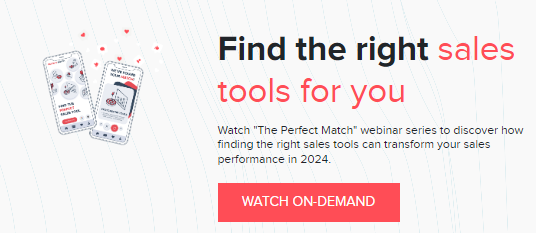
Don't limit yourself to one form of content. You may start with basic blog posts but can always branch out to infographics, virtual events, webinars, podcasts, etc.
5. Leverage Email Marketing to Convert Leads
Email marketing hasn't lost its charm, even with social media being as big as it is today. The email addresses you collect through your lead magnets can be an excellent source for turning leads into clients of your digital marketing agency.
There are several ways to use email marketing to grow as a digital marketing agency. The most obvious would be to send newsletters with your latest blog posts and company updates.
You could make it a monthly or bi-weekly initiative to connect with your leads through emails.
The newsletter will build rapport and keep you at the back of their minds when they require your services.
Similarly, let's say you've released a new marketing report for the year, or you're holding a webinar about a hot topic in your industry. Let your email list know to attract attendees for your virtual event.
Personalize your emails to maximize their impact. Address your leads by their names and share content that's relevant to them.
We now have AI to make these tasks more efficient. For example, you can use a tool like Copy.ai to write emails.

The AI writing tool matches your brand voice to give a human touch to your communication. You can always go ahead and edit the content if necessary.
Similarly, Constant Contact also has an AI email writer that you can use to craft product promos, announcements, newsletters, and regular emails. Since the tool also has other email marketing features, it can be a handy all-in-one solution for your agency.
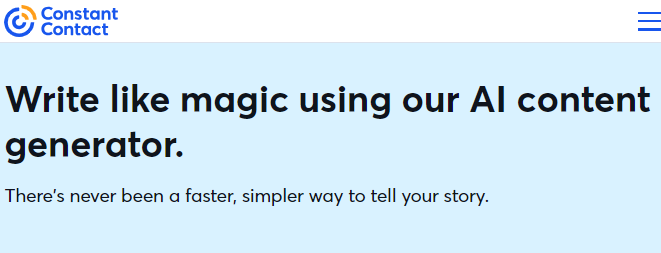
6. Use Social Media to Your Advantage
Social media is every business's best friend these days. It's where half the world's population can be found.
You can use a bunch of social media platforms to connect with your potential leads. Facebook definitely comes up as the first option. The same is true for LinkedIn.
B2B businesses like digital marketing agencies don't find TikTok and Instagram relevant enough to use them as main promotional platforms.
However, the inclusion of visual content in your marketing strategy can be helpful. So, don't fully ignore these platforms.
Now, onto the type of content, you can post on social media:
- Share snippets of your blog posts with links to the full post. (X is also an excellent platform in this regard)
- Share customer video testimonials.
- Create and share infographics around new data or stats related to the digital marketing industry.
- Create polls or surveys to engage with your audience.
- Host live Q&A sessions.
- Live stream digital marketing-related workshops or seminars.
- Share news and achievements of your agency.
Ignite Visibility shares most of these types of content on its Instagram page.
The agency's bio is also well-written, with a link to its website along with its physical address for clients to contact them.
7. Run Paid Ads
There's no doubt in the effectiveness of organic search results. But that doesn't mean you can't use paid ads.
When you're in the process of growing your digital marketing agency, paid ads can often give you quick and much-needed visibility in the search engine result pages (SERPs).
Here's an ad from Pixated, a PPC agency, that pops up when you search for digital marketing agencies in New York.

Google Ads are the first resort in the paid ads game. Social media ads, such as Facebook and LinkedIn, also offer effective targeting options.
When using Google, we recommend opting for Responsive Search Ads. These are Google's AI-based ad format, where they allow you to provide up to 15 headlines and four descriptions that Google will then mix and match to display the most relevant combination for a user's search query.
These ads bring a touch of personalization to your paid campaigns. They also help you find the best combination of ad copies, which you can also use for your organic search snippets.
Head 45 Dental, a dental marketing agency, runs responsive search ads on Google. You can see two headlines in the ad below. Google can choose to show one, two, or even three headlines in the final ad.

In the meta description below, the words in our search query (dental marketing agency) are bold.
What makes this ad even more effective is the ''Call Us'' button, which makes it easy for potential clients to contact the agency directly from the ad.
8. Monitor Your Performance Metrics
Every business has some key performance indicators (KPIs) that it needs to track to understand how well it is performing. Your digital marketing agency should have them, too.
Some examples of KPIs for a digital marketing agency include:
- Conversion Rate: Percentage of website visitors that take a desired action
- Cost Per Acquisition (CPA): Average cost to acquire a new customer or lead
- Return on Investment (ROI): The amount of revenue generated compared to the amount spent on marketing
- Click-through Rate (CTR): Percentage of clicks received out of the total number of impressions
- Cost Per Click (CPC): Average cost for each click on an ad
- Bounce Rate: Percentage of website visitors who leave after viewing only one page
- Social Media Engagement: Number of likes, comments, shares, and other interactions on social media platforms
- Email Open and Click-through Rates: Percentage of email subscribers who open and click on links within an email
Google Analytics is the go-to tool for tracking website and PPC-related metrics. For email and social media metrics, you can use specialized tools such as Mailchimp and Hootsuite.
Once you have a snapshot of your performance, compare it to your objectives and industry benchmarks.
Suppose your agency's goal is to increase website conversions by 20% within the next six months. After six months, measure the relevant metrics.
If they're not up to the mark, look for patterns in your data to identify areas that need improvement.
For example, if your CPC is higher than industry benchmarks, it may be time to revisit your ad targeting and messaging.
If your email open rates are low, try A/B testing subject lines and email content to see what resonates with your audience. The key is to optimize your marketing strategies based on the data you collect.
SendCheckIt is a simple tool to test your email subject lines. You can use it to check how your subject lines do against emails written by other marketers.

Refine by Moosend is another good option. It lets you test subject lines by industry to make them more personalized for your client personas.

9. Upskill Your Team
Digital marketing is a dynamic field; new trends emerge every day. You want your team to be on top of these trends to provide the best services to your clients.
Team upskilling mainly involves two areas: technical skills and soft skills.
The technical part has to do with the actual services you offer. For example, you can make your team enroll in AI courses to learn about using AI in digital marketing.

Soft skills are equally important because they affect how your team interacts with clients.
Again, your team can take courses to improve its soft skills. You can also offer in-house training programs with senior team members as trainers.
Upskilling helps grow your business by making you stand out. After all, you're doing something your competitors may not be doing. Clients tend to find that impressive.
10. Generate Recurring Revenues
As a new digital marketing agency, your offerings may not be vast enough to justify a subscription-based model. But as you grow and build a loyal client base, offer recurring services to generate stable monthly revenues.
Robin Leonard, a Partner at Xenai Digital, explains,
The answer is to build recurring revenues in a retainer style relationship where you bill monthly for a fixed set of services (for example, X published blogs per week, Y Facebook posts per day etc).
A recurring model ensures a consistent cash flow. It also saves you time that you'd otherwise have to spend pitching and winning new clients.
11. Increase Your Service Offerings
What better way to grow than by providing more services to your clients? If you have the human and financial resources to expand, you can cater to more of your client's digital marketing needs.
For instance, you may start as a social media marketing agency. However, over time, you can offer email marketing and PPC services to your suite.
If you're not entirely sure you can handle everything in-house, look for partnerships. Collaborate with other agencies or freelancers that specialize in the areas you want to expand into.
12. Use Influencer Marketing to Get the Word Out
Influencer marketing is often overlooked in B2B digital marketing, but it can be a useful tool to grow your business.
It doesn't work the way it does in B2C marketing, though. You're not looking for accounts with the largest following or celebrities.
Instead, you want to find individuals who have an engaged audience within the marketing world. These people could be X users with a sizable following in the industry or LinkedIn gurus.
Take Joe Pulizzi as an example. He is the brain behind Content Marketing Institute and has a decent following on Twitter.
Every content creator needs to keep this top of mind at all times. https://t.co/D7w2LyHmJM
— Joe Pulizzi (@JoePulizzi) April 25, 2024
Since he's seen as an authority in the content marketing world, his recommendations hold weight. He's a good candidate for influencer marketing.
In B2B influencer marketing, the ''influencers'' can create a positive reputation for your agency by recommending your services to their audience. You can also host webinars or collaborate on content with influencers to reach their audience.
Conclusion
Growing a digital marketing agency is a multi-faceted process that requires a combination of internal updates and marketing channels. The idea is to create a blend that's specific to your business and target audience.
Monitor every step of your growth plan and make changes as needed. While you're at it, experiment with different channels and marketing approaches.
You never know which one will give you the breakthrough your business needs.
